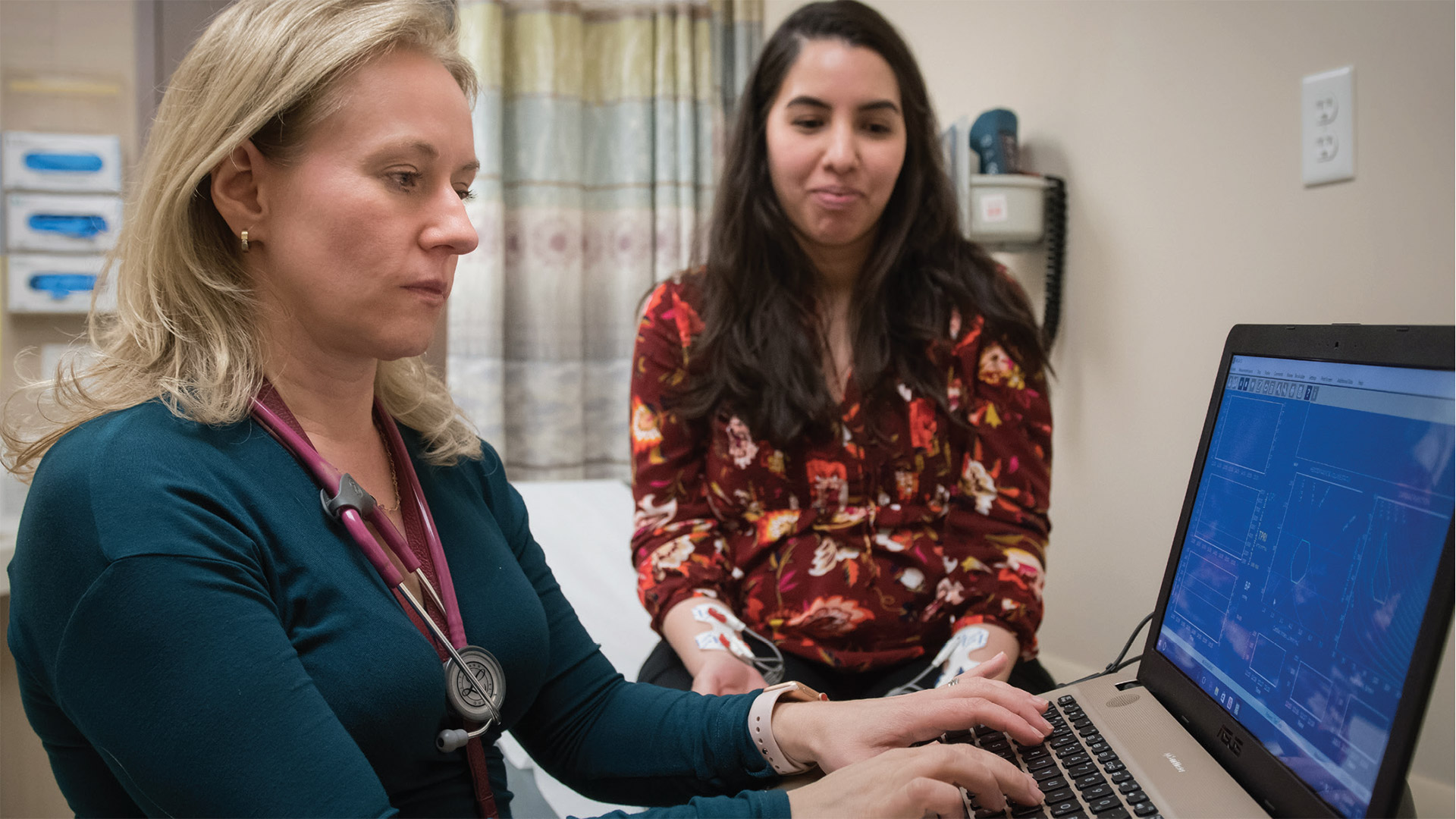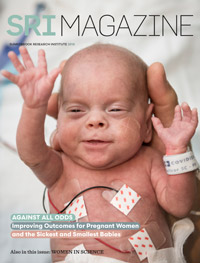Is pregnancy an option for women with kidney disease?

Yes, say researchers studying advanced technologies and fresh approaches for this group of aspiring moms
September 12, 2018

Dr. Michelle Hladunewich (left), who formed the Pregnancy and Kidney Clinic at Sunnybrook, evaluates the role of the placenta in pregnant women with kidney disease.
Some scientists are spurred by an insatiable curiosity. A novel idea germinates in their brains, and they’re driven to the lab bench to test it. Dr. Michelle Hladunewich, an associate scientist in the Women & Babies Research Program at Sunnybrook Research Institute (SRI), operates differently.
“I do research based on clinical things I see in my practice,” says the nephrologist, a type of doctor who specializes in treating kidney disorders. “There are holes in our ability to care for people properly, and that’s what motivates me to study a research question.” Hladunewich, who is also an associate professor at the University of Toronto, adds, “I can put a face to pretty much everything I’m doing. I see people who have issues, and I want to help them.”
One group she endeavours to help is women with kidney disease who are pregnant or considering pregnancy, a population she says can be tricky to treat because each patient requires an individualized management strategy. Kidney disease is a term encompassing a variety of diseases and disorders affecting the kidneys, most of which result in the organs’ inability to filter waste from blood and remove excess fluid from the body. Ranging from mild to severe, it’s estimated that one in 10 Canadians has kidney disease.
Research on pregnant women with kidney disease is sparse. There is no statistic on how many of these women go on to deliver babies—although Hladunewich plans to change this via her work—and results from a recent survey by the Ontario Renal Network indicate only about 10% of nephrologists are comfortable caring for pregnant women with kidney disease. Hladunewich attributes this to the disease’s rarity and those doctors’ lack of exposure to kidney-compromised pregnant women during training, in addition to lack of evidence-based guidelines.
To assist these women and provide doctors with confidence in treating them, nearly 10 years ago Hladunewich established the Pregnancy and Kidney (Pre-Kid) Clinic—the largest in Canada, which manages pregnant women with kidney disease—and began building a registry that now includes approximately 1,000 women from which meaningful information can be extracted. One of the earliest findings pertains to dialysis.
Canadian women on dialysis, a treatment that partly replaces kidney function, were told to avoid pregnancy five to 10 years ago because the live birth rate for women who did deliver was less than 50%, Hladunewich says. She adds that this remains the case in the U.S. “Our first pregnancy on dialysis was accidental,” she says, before explaining that she and her colleagues did not expect fertility to return with dialysis. “With better dialysis, women became pregnant and did well; so, we changed our stance on it and made it an option. Now, we’ve had over 30 women [between Sunnybrook and Mount Sinai Hospital] deliver on dialysis. It’s important to show women that you can have a baby [while] on dialysis.”
The aim of the registry, which is the largest in North America, is to arm specialists with the evidence they need to help women make informed choices about pregnancy. “These women are making life or death decisions—whether they should have a child or terminate their pregnancy,” Hladunewich says. “We give our opinion, but it’s their choice. I would sure like to be using better data when helping them make such big decisions, though.”
With the registry and clinic reaching a critical mass, she and her colleagues can apply for grants. One grant they’ve received is for a study headed by Hladunewich and Dr. Nir Melamed, an associate scientist in the Women & Babies Research Program at SRI and a maternal-fetal medicine specialist at Sunnybrook. Together with Dr. Dini Hui, who is also a maternal-fetal medicine specialist at Sunnybrook and who helped launch the PreKid Clinic, they will investigate the role of the placenta in pregnant women with kidney disease.
Their research aims to identify biological substances in the blood, so-called “biomarkers,” that can reveal information about the current and predicted future health of a woman and her baby. “We’re looking for markers that are released by the placenta into the bloodstream, and we’re correlating that with [the woman’s] kidney disease and then her baby’s outcome,” Hladunewich says. Melamed, who is also an associate professor at U of T, adds, “Managing pregnancies in these women with kidney disease can be very challenging, so what we’re trying to do is use new technologies and new approaches to help us guide treatment.” Launched in January 2018, the study will run for two years.
One such technology is a noninvasive cardiac monitoring system, which takes readings from electrodes placed on a woman’s wrists and ankles, and depicts them on a computer screen for practitioners to evaluate. As Melamed gazes toward the machine in his office, his eyes light up, and he says, “This sophisticated device allows us to noninvasively check multiple hemodynamic parameters, such as cardiac output and vascular resistance—things we can’t usually measure and record. It gives us insight into what’s happening.” He equates the device’s ease of use to that of an electrocardiogram, and says measuring hemodynamic parameters can be of great value in identifying women whose bodies have failed to adapt to pregnancy, and who therefore are at increased risk of complications. At the moment, blood pressure is the only measurement taken in the clinic, which Melamed says may not provide enough information to determine if a woman with kidney disease is adapting to pregnancy. He adds that other physiological information yielded from the machine would indicate what medication is best suited to a particular patient.
With approval from Sunnybrook’s research ethics board to record measurements and track outcomes throughout the pregnancies of consenting women, Hladunewich says the goal is to incorporate the device into everyday practice. She and Melamed will collect data for two years—they need to have data from roughly 200 patients—prior to making a case for the device’s routine use to manage blood pressure in the clinic better and identify which women need interventions to help prolong their pregnancies and deliver a baby successfully.
Before Hladunewich returns to one of the 50 patients she sees in a week, she revisits her motivation and the striking figure that only about 10% of nephrologists are comfortable treating pregnant women with kidney disease. “I never, not in a million years, would have thought people were that uncomfortable,” she says. “We’re filling a big gap here. We have to evolve care for these women. Every woman has her very own reason for [having a child], and we have to be respectful of her choices. Some will feel strongly that they have to have a child, even if it’s a peril to their own well-being. It’s our job to make it safe, to help them time it, to get them as healthy as possible and then support whatever their decision is.”
Hladunewich’s research is supported by the Canadian Institutes of Health Research, Cancer Care Ontario, the Kidney Foundation of Canada and Roche Diagnostics.



